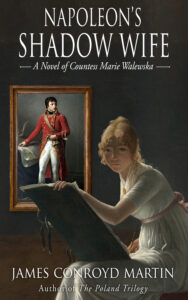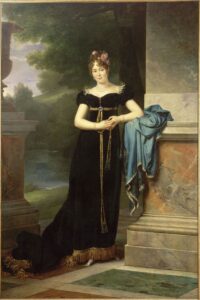 With Napoleon’s Shadow Wife, author James Conroyd Martin has captured the spirit and story of Napoleon Bonaparte’s Polish mistress, Marie (née Łączyńska) Walewska. The novel is Martin’s eighth novel and the fifth set in Polish history. I recently finished this and recommend it to anyone interested in historical fiction, strong women, or a great read. Marie is a fascinating historical figure. Her mother forced her into an arranged, and loveless marriage at age seventeen to the wealthy, but sixty-eight-year-old Count Walewska. From there, she had to maneuver the world of aristocrats, politicians, and men with little training and no support.
With Napoleon’s Shadow Wife, author James Conroyd Martin has captured the spirit and story of Napoleon Bonaparte’s Polish mistress, Marie (née Łączyńska) Walewska. The novel is Martin’s eighth novel and the fifth set in Polish history. I recently finished this and recommend it to anyone interested in historical fiction, strong women, or a great read. Marie is a fascinating historical figure. Her mother forced her into an arranged, and loveless marriage at age seventeen to the wealthy, but sixty-eight-year-old Count Walewska. From there, she had to maneuver the world of aristocrats, politicians, and men with little training and no support.
I had the chance to interview James recently and he filled me in on some of the background of this book.
Where did your interest in Polish stories begin?
Years ago, I left Chicago and settled in Hollywood, California, intent on being a screenwriter. I met new friends, one of whom was John Stelnicki, who asked me to read and possibly do something with the diary of his ancestor, Anna Stelnicka, a Polish countess who lived through the dissolution of Poland as a nation (1791- 1831 and beyond). I read it to be polite, coming to realize how much of a Gone with the Wind it was, with two cousins vying for the same man and set against a country and way of life that was passing into history. St. Martin’s Press wanted a sequel and that led to a trilogy.
Why Marie Walewska? What captured your interest to research and write her story?

I had heard people talk of Countess Marie Walewska, and I had seen the 1937 film Conquest with Greta Garbo as Marie and Charles Boyer as Napoleon. In researching the second book of my Poland trilogy, Against a Crimson Sky, which covered the Napoleonic years, I could not help but learn a great deal about her. It came as no surprise that Hollywood had invented a good deal of their screenplay.
But it was only in focusing on the woman as the main player in my novel that I came to feel I understood her. Even after I had written the first draft, I was still unsure about having captured her essence. But only as I went over the research again and followed through on one rewrite and then another, did I feel as if I came to really know her.
The novel takes place from 1803-1814. What makes this period such a pivotal time in Polish/European history?
Poland no longer existed as an independent nation at this time, having been conquered and partitioned by Austria, Prussia, and Russia. The Poles nonetheless held their language, culture, and spirit as sacrosanct. When Napoleon, envisioning a unified European empire under French control, came calling and requested Poland’s patriots to supply him with soldiers in his attempt to conquer Russia, Poles acceded to his wishes, imagining he would reestablish an independent Poland.
How did you conduct your research for the book? Were there any surprises you discovered along the way?
I already had a wealth of books on Napoleon and several on Marie Walewska because the second book in my trilogy covers the same years. I continued to do digging, however, through histories and online. Napoleon had a number of odd habits that were surprising. Also, as secure and aggressive as he could be on the battlefield and in the presence of kings and popes, he showed insecurity in the presence of his valet and with Marie. Marie’s life decisions were always surprising.
What would you like readers to remember about your story?
I would like readers to remember Marie Walewska as having led a profoundly paradoxical life. I’ve tried to present the facts with balance, allowing readers to form their own impressions of this singular and multifaceted woman.
Your stories tend to focus on female protagonists. Is this hard to write from a male perspective?
It was at first, but the women in my critique groups, back in California and then in the Chicago and Portland areas kept me in line. I owe them.
What’s a fun fact that most readers may not know about you?
 While living in Hollywood, I attended a one-woman show by Bette Davis. A comment I made as I sat close to the stage prompted her to lean over and invite me backstage after the event. There, I took the opportunity to tell her about the unpublished Push Not the River, and she suggested I send her the manuscript. I did so, and received a lovely complimentary note from her.
While living in Hollywood, I attended a one-woman show by Bette Davis. A comment I made as I sat close to the stage prompted her to lean over and invite me backstage after the event. There, I took the opportunity to tell her about the unpublished Push Not the River, and she suggested I send her the manuscript. I did so, and received a lovely complimentary note from her.
For more information on the author, visit jamescmartin.com. The book is available in print and eBook formats. You can buy a copy at this universal buy link: Click here.
P.S. I first discovered James Martin’s writing when I read Push Not the River in 2016 and loved it. At the time, my book Henry was still a manuscript, and a friend knew I was reading anything connected to Poland. I quickly read the next two books in his Polish trilogy and became a fan. I first posted about Martin eight years ago. To review that post, click here.
Other Books by James Conroyd Martin
Push Not the River (The Poland Trilogy, #1)
Against a Crimson Sky (The Poland Trilogy, #2)
The Warsaw Conspiracy (The Poland Trilogy #3)
Hologram: A Haunting
The Boy Who Wanted Wings
Fortune’s Child (The Theodora Duology #1)
Too Soon the Night (The Theodora Duology #2)
